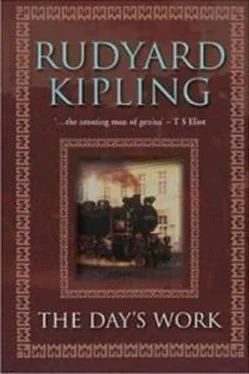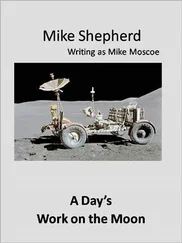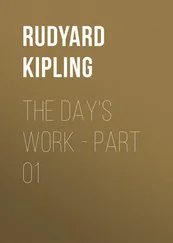Джозеф Киплинг - The Day's Work - Volume 1
Здесь есть возможность читать онлайн «Джозеф Киплинг - The Day's Work - Volume 1» весь текст электронной книги совершенно бесплатно (целиком полную версию без сокращений). В некоторых случаях можно слушать аудио, скачать через торрент в формате fb2 и присутствует краткое содержание. Год выпуска: 2014, Издательство: epubBooks Classics, Жанр: Прочие приключения, на английском языке. Описание произведения, (предисловие) а так же отзывы посетителей доступны на портале библиотеки ЛибКат.
- Название:The Day's Work - Volume 1
- Автор:
- Издательство:epubBooks Classics
- Жанр:
- Год:2014
- ISBN:нет данных
- Рейтинг книги:3 / 5. Голосов: 1
-
Избранное:Добавить в избранное
- Отзывы:
-
Ваша оценка:
- 60
- 1
- 2
- 3
- 4
- 5
The Day's Work - Volume 1: краткое содержание, описание и аннотация
Предлагаем к чтению аннотацию, описание, краткое содержание или предисловие (зависит от того, что написал сам автор книги «The Day's Work - Volume 1»). Если вы не нашли необходимую информацию о книге — напишите в комментариях, мы постараемся отыскать её.
The Day's Work - Volume 1 — читать онлайн бесплатно полную книгу (весь текст) целиком
Ниже представлен текст книги, разбитый по страницам. Система сохранения места последней прочитанной страницы, позволяет с удобством читать онлайн бесплатно книгу «The Day's Work - Volume 1», без необходимости каждый раз заново искать на чём Вы остановились. Поставьте закладку, и сможете в любой момент перейти на страницу, на которой закончили чтение.
Интервал:
Закладка:
"I will not go—I will not go!" shrieked the child, twining his feet round Scott's ankle. "They will kill me here. I do not know these people."
"I say," said Scott, in broken Tamil, "I say, she will do you no harm. Go with her and be well fed."
"Come!" said William, panting, with a wrathful glance at Scott, who stood helpless and, as it were, hamstrung.
"Go back," said Scott quickly to William. "I'll send the little chap over in a minute."
The tone of authority had its effect, but in a way Scott did not exactly intend. The boy loosened his grasp, and said with gravity: "I did not know the woman was thine. I will go." Then he cried to his companions, a mob of three–, four–, and five–year–olds waiting on the success of his venture ere they stampeded: "Go back and eat. It is our man's woman. She will obey his orders."
Jim collapsed where he sat; Faiz Ullah and the two policemen grinned; and Scott's orders to the cartmen flew like hail.
"That is the custom of the Sahibs when truth is told in their presence," said Faiz Ullah. "The time comes that I must seek new service. Young wives, especially such as speak our language and have knowledge of the ways of the Police, make great trouble for honest butlers in the matter of weekly accounts."
What William thought of it all she did not say, but when her brother, ten days later, came to camp for orders, and heard of Scott's performances, he said, laughing: "Well, that settles it. He'll be Bakri Scott to the end of his days." (Bakri in the Northern vernacular, means a goat.) "What a lark! I'd have given a month's pay to have seen him nursing famine babies. I fed some with conjee [rice–water], but that was all right."
"It's perfectly disgusting," said his sister, with blazing eyes. "A man does something like—like that—and all you other men think of is to give him an absurd nickname, and then you laugh and think it's funny."
"Ah," said Mrs. Jim, sympathetically.
"Well, you can't talk, William. You christened little Miss Demby the Button–quail, last cold weather; you know you did. India's the land of nicknames."
"That's different," William replied. "She was only a girl, and she hadn't done anything except walk like a quail, and she does. But it isn't fair to make fun of a man."
"Scott won't care," said Martyn. "You can't get a rise out of old Scotty. I've been trying for eight years, and you've only known him for three. How does he look?"
"He looks very well," said William, and went away with a flushed cheek. "Bakri Scott, indeed!" Then she laughed to herself, for she knew her country. "But it will he Bakri all the same"; and she repeated it under her breath several times slowly, whispering it into favour.
When he returned to his duties on the railway, Martyn spread the name far and wide among his associates, so that Scott met it as he led his paddy–carts to war. The natives believed it to be some English title of honour, and the cart–drivers used it in all simplicity till Faiz Ullah, who did not approve of foreign japes, broke their heads. There was very little time for milking now, except at the big camps, where Jim had extended Scott's idea and was feeding large flocks on the useless northern grains. Sufficient paddy had come now into the Eight Districts to hold the people safe, if it were only distributed quickly, and for that purpose no one was better than the big Canal officer, who never lost his temper, never gave an unnecessary order, and never questioned an order given. Scott pressed on, saving his cattle, washing their galled necks daily, so that no time should be lost on the road; reported himself with his rice at the minor famine–sheds, unloaded, and went back light by forced night–march to the next distributing centre, to find Hawkins's unvarying telegram: "Do it again." And he did it again and again, and yet again, while Jim Hawkins, fifty miles away, marked off on a big map the tracks of his wheels gridironing the stricken lands. Others did well—Hawkins reported at the end they all did well—but Scott was the most excellent, for he kept good coined rupees by him, settled for his own cart–repairs on the spot, and ran to meet all sorts of unconsidered extras, trusting to be recouped later on. Theoretically, the Government should have paid for every shoe and linchpin, for every hand employed in the loading; but Government vouchers cash themselves slowly, and intelligent and efficient clerks write at great length, contesting unauthorised expenditures of eight annas. The man who wants to make his work a success must draw on his own bank–account of money or other things as he goes.
"I told you he'd work," said Jimmy to his wife, at the end of six weeks. "He's been in sole charge of a couple of thousand men up north, on the Mosuhl Canal, for a year; but he gives less trouble than young Martyn with his ten constables; and I'm morally certain—only Government doesn't recognise moral obligations—he's spent about half his pay to grease his wheels. Look at this, Lizzie, for one week's work! Forty miles in two days with twelve carts; two days' halt building a famine–shed for young Rogers. (Rogers ought to have built it himself, the idiot!) Then forty miles back again, loading six carts on the way, and distributing all Sunday. Then in the evening he pitches in a twenty–page Demi–Official to me, saying the people where he is might be 'advantageously employed on relief–work,' and suggesting that he put 'em to work on some broken–down old reservoir he's discovered, so as to have a good water–supply when the Rains break. 'Thinks he can cauk the dam in a fortnight. Look at his marginal sketches—aren't they clear and good? I knew he was pukka, but I didn't know he was as pukka as this."
"I must show these to William," said Mrs. Jim. "The child's wearing herself out among the babies."
"Not more than you are, dear. Well, another two months ought to see us out of the wood. I'm sorry it's not in my power to recommend you for a V. C."
William sat late in her tent that night, reading through page after page of the square handwriting, patting the sketches of proposed repairs to the reservoir, and wrinkling her eyebrows over the columns of figures of estimated water–supply. "And he finds time to do all this," she cried to herself, "and—well, I also was present. I've saved one or two babies."
She dreamed for the twentieth time of the god in the golden dust, and woke refreshed to feed loathsome black children, scores of them, wastrels picked up by the wayside, their bones almost breaking their skin, terrible and covered with sores.
Scott was not allowed to leave his cart–work, but his letter was duly forwarded to the Government, and he had the consolation, not rare in India, of knowing that another man was reaping where he had sown. That also was discipline profitable to the soul.
"He's much too good to waste on canals," said Jimmy. "Any one can oversee coolies. You needn't be angry, William; he can—but I need my pearl among bullock–drivers, and I've transferred him to the Khanda district, where he'll have it all to do over again. He should be marching now.
"He's not a coolie," said William, furiously. "He ought to be doing his regulation work."
"He's the best man in his service, and that's saying a good deal; but if you must use razors to cut grindstones, why, I prefer the best cutlery."
"Isn't it almost time we saw him again?" said Mrs. Jim. "I'm sure the poor boy hasn't had a respectable meal for a month. He probably sits on a cart and eats sardines with his fingers."
"All in good time, dear. Duty before decency—wasn't it Mr. Chucks said that?"
"No; it was Midshipman Easy," William laughed. "I sometimes wonder how it will feel to dance or listen to a band again, or sit under a roof. I can't believe I ever wore a ball–frock in my life."
Читать дальшеИнтервал:
Закладка:
Похожие книги на «The Day's Work - Volume 1»
Представляем Вашему вниманию похожие книги на «The Day's Work - Volume 1» списком для выбора. Мы отобрали схожую по названию и смыслу литературу в надежде предоставить читателям больше вариантов отыскать новые, интересные, ещё непрочитанные произведения.
Обсуждение, отзывы о книге «The Day's Work - Volume 1» и просто собственные мнения читателей. Оставьте ваши комментарии, напишите, что Вы думаете о произведении, его смысле или главных героях. Укажите что конкретно понравилось, а что нет, и почему Вы так считаете.












